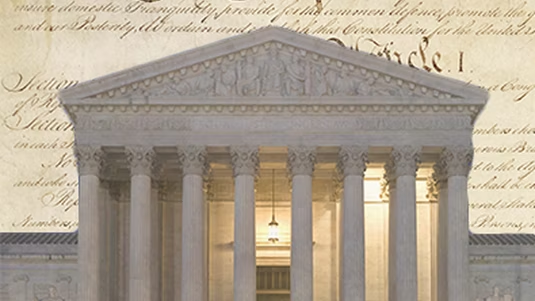Chemerinsky on Constitutional Law The Structure of Government free videos and free material uploaded by University of California, Irvine Staff .
Welcome - Let's Get Started
Lecture 1 - Why the Constitution?
In this module, we'll examine two facets of the critical question, "Why the Constitution?" First we'll answer the question, "what functions does the Constitution perform?" We'll then consider the question, "why achieve these functions in the form of a written Constitution?"
Lecture 2 - The Federal Judicial Power
What is the authority of judicial review? Why is it important? If the federal judiciary can declare a statute or action unconstitutional, what checks are there on this power? These are several of the questions we will endeavor to answer in this module.
Lecture 3 - The Federal Legislative Power
In this module we will consider three major questions: 1.How did McCullough vs. Maryland shape the power of the legislature? 2. What are the major powers of the Congress under the Constitution? 3. To what extent do states limit the power of the Congress?
Lecture 4 - The Federal Executive Power
The central questions in this module are: 1. When can a president act without express Constitutional or Congressional authority? 2. What are the Constitutional problems posed by the federal administrative agencies? 3. What is the authority of the President with regard to foreign policy?
Lecture 5 - Federalism
The goal of this module is to consider two important ways that the power of states are kept in check by the federal government: preemption and the dormant commerce clause.
Conclusion
As the course draws to a final close, we would like to thank you for your participation.
This course will highlight the construction and interpretation of the U.S. Constitution through the centuries. You'll learn the history behind the Constitution, cases that formed important precedent, and how changes in interpretation have been dependent on shifts in cultural and political climate as well as the composition of the Supreme Court.
We'll start with an overview of the Constitution where we'll consider questions such as "Why the Constitution?" and "What function does the Constitution serve?" Next we'll examine how the Constitution and its subsequent interpretation established the powers of the federal, legislative, and judicial branches of government and allocated powers to the states.
Join me as we look at the questions both raised and answered by the Constitution and those that interpret it!
By the end of this course, you should be able to:
- Describe how the structure of the United States government has been shaped by both the text of the Constitution and by subsequent interpretation and practice of political actors in all branches of government
- Illustrate compromises found in the Constitution by citing examples and historic background
- Articulate the importance of key cases such as Marbury v. Madison, McCullough v. Maryland, and Lochner v. New York
- Explain how the outcome of cases is often dependent upon the current cultural and political climate as well as the composition of the court by citing particular cases and important shifts in the court's jurisprudence
- Assess the relative suitability of various approaches to constitutional interpretation and analysis

- 0 Reviews
- 1 Students
- 179 Courses

Write a public review